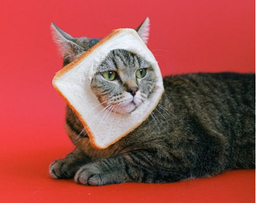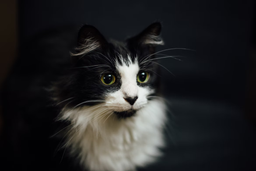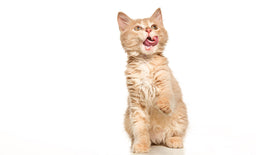Can cats eat bones? Learn about the potential risks with Untamed
Bones are a go-to snack for dogs and contribute to their dental and overall health. Is it ok to give the same delicious treat to felines, and which bones are safe for them?
We will also explore the benefits and risks of feeding bones to your kitty and help you decide on the best cat diet by explaining what cats should and shouldn’t eat. Can cats eat bones? Get the final answer from Untamed.

Trick or treat? Bones are tasty but unsafe for cats.
Source: achirathep
Can cats eat chicken bones?
Cats are obligate carnivores, and their natural feeding pattern revolves around meat. Kitties who live in the wild hunt and eat small animals like mice, squirrels, rabbits, insects, and birds. Eating raw meat comes naturally to cats, so you won’t be surprised to learn that this includes organs, flesh, contents of the gut, and even bones.
Many cat parents rightfully believe that they should stick to their pets’ natural feeding routine, so the most obvious option is biologically appropriate raw food (B.A.R.F.). While your feline friend can benefit from the B.A.R.F. diet, the risks outweigh the benefits. Raw food contains harmful bacteria, such as Listeria, Salmonella, and E. coli. These pathogens can cause an infection with a lethal outcome. There is also a risk of cross-contamination, so your feline companion isn’t the only one at risk.
Since indoor kitties don’t hunt their prey, they won’t eat killed animals. Raw food that you’d feed to your cat comes from the human supply chain. Depending on the source, the bones you get at the butcher shop can be too large for your cat, so they can be a choking hazard.
Poultry bones are the only acceptable option, but you should feed them to your kitty with extra care. Go for wing and neck bones only. The chicken neck contains cartilage, a natural source of chondroitin and glucosamine, which support joint health.
Can cats eat cooked chicken bones?
Cooked chicken bones are a no-no for cats because cooking makes them soft and brittle. They tend to splinter easily, and the shards can get stuck in your furball’s throat, causing them to choke. Choking isn’t the only danger of cooked bones. They can hurt your kitty’s mouth, throat, and oesophagal lining, causing internal bleeding, which can be lethal if not treated quickly.
It’s also dangerous to feed leftover bones to your feline. Many human products, such as onions and garlic, are toxic to cats so keep the leftovers of your lunch far away from your kitty.
Cats and raw chicken bones—a match made in heaven or a bad combination?
Raw chicken bones are a better but not a risk-free option. Let’s go through the pros and cons to help you understand the potential benefits and dangers.
Benefits of raw chicken bones
Raw bones can be beneficial to your kitty’s health because they:
- Help maintain dental health—If your cat’s teeth aren’t cleaned regularly, plaque builds up, hardens over time, and leads to gingivitis and tooth resorption. Chewing bones massages the gums and scrapes the teeth, removing the plaque
- Contain calcium—Calcium is an important mineral that helps muscles contract, regulates normal heart rhythm, and maintains proper nerve function. Raw bones are an excellent source of easily digestible calcium
- Are full of collagen—Collagen is abundant in your cat’s body. It can be found in skin, bones, muscles, tendons, blood vessels, and the digestive system. This protein supports your furry friend’s joint and tendon health and enhances your furball’s skin and coat
Risks of raw chicken bones
Eating raw bones has many downsides, as follows:
- Infections—Raw food, including bones, may contain harmful bacteria. Salmonellosis and listeriosis can be fatal if not treated immediately. The symptoms include:
- Vomiting
- Diarrhoea
- High fever
- Loss of appetite
- Lethargy
- Teeth breaking—As bones are hard, your feline can damage their teeth while trying to chew the bone. There are safer alternatives for maintaining oral hygiene, such as special dental food
- Choking hazard—If you decide to include bones into your furry friend’s diet, you will have to monitor them while they’re eating. Splintered bones can get stuck in your cat's throat and block the airways. If your cat starts choking on a bone, you should do a cat Heimlich manoeuvre or remove the obstruction manually. You should also take them to the vet immediately
- Gastrointestinal issues—Cats’ digestive systems are sensitive, so they might not be able to break down particular components of the bone efficiently, which often leads to constipation
Even though bones are not toxic, the accompanying risks outweigh the benefits, especially with numerous similar yet safe products available in pet stores.

Mmm, what’s that smell, hooman? Is that nice food for me?
Source: Bluebird Provisions
If bones are beneficial for cats, is there a safer way to incorporate them into the feline diet?
Since bones can be good for your kitty because of their protein and calcium content, you should add them to your kitty’s diet. The safest and most delicious option is chicken bone broth. You can also use beef and pork in soups and broths.
Bone broth or soup is an excellent source of much-needed moisture in your cat’s food. It is important to note that they shouldn’t contain any seasoning. Most spices in your kitchen aren’t suitable for feline consumption as cats cannot break down plant-based products effectively.
Soups and broths come in handy if your feline friend dislikes wet food—dip cat biscuits in bone broth to provide necessary moisture to your kibble-loving kitty.
How to cook a bone broth
If you want to cook a delicious homemade broth for your furry companion, check out the best and simplest recipe in the table below:
|
Ingredients |
Method |
|
Collagen and other essential nutrients will dissolve during cooking, so broths and soups support organ functions and improve skin, muscle, ligament, and coat health.
What to do if your cat eats a cooked bone
If your cat ate a cooked chicken bone—don’t panic. Call your vet and explain the situation. They will tell you whether you should take your kitty for a checkup. Keep a close eye on your cat during the following few days in case the bone causes damage. The concerning symptoms are:
- Vomiting
- Diarrhoea
- Bloating
- Loss of appetite
- Lethargy
Check out their stool and monitor them for any signs of pain because bone shreds can cause internal injuries and haemorrhages.

Cats need protein, fat, and vitamins from meat to be healthy and happy.
Image (c) Untamed
Cats eat chicken bones—why?
Is your furball craving bones? It's probably due to a lack of specific nutrients, such as calcium, phosphorus, and magnesium. You should make sure that they get those nutrients from their regular meals. High-quality cat food must contain:
- Protein—Animal protein is the crucial energy source for cats, and it contains essential amino acids, such as taurine and arginine, which cats cannot synthesise. Amino acids are vital for eye health and heart muscle function. As felines cannot digest proteins from plants, their diet should be based exclusively on meat, ideally chicken, fish (e.g. tuna, salmon, sardines), crustaceans (e.g. prawn), and organs (e.g. liver)
- Moisture—Cats extract moisture from food, so they don’t instinctively drink water. Their meals should be moist enough to prevent dehydration. Serving only dry food won't keep them properly hydrated and can potentially lead to health issues like cystitis, constipation, and bladder stones
- Vitamins and minerals—These micronutrients are crucial for your furball’s metabolism and overall health. Whole meat should deliver all necessary vitamins and minerals, so your feline won’t need dietary supplements
Carbohydrates (even fibre) are useless because cats cannot digest them. Keep carb-rich food off your feline’s menu to prevent weight gain and various gastrointestinal problems.
Check out the table below to see the ideal nutrient ratio of a cat’s diet:
|
Nutrient |
Recommended amount |
|
Protein |
Over 50% |
|
Fat |
Up to 20% |
|
Carbs |
Less than 3% |

You, your kitty, and Untamed equals one big happy family!
Image (c) Untamed
Untamed—cat food that has it all
Untamed offers complete, balanced, and delicious jelly and gravy meals that even picky eaters cannot resist. The ingredients in our food are ethically sourced and of human-grade quality. Every dish is:
- Packed with protein—A single portion of Untamed contains twice as much protein as the industry standard. Our food is completely free of grain, meat derivatives, and other useless substances that would only harm your cat
- Vet-formulated—Our recipes are designed by vets to meet your cat’s specific nutritional needs. We don’t use any common allergens in our food
- Gently cooked—We simmer our dishes gently to preserve the essential micro and macronutrients. By gently steaming our food, we also keep the aroma and flavour intact
- Delivered in recyclable packaging—Our packaging is eco-friendly, and our operations leave a neutral carbon footprint
Untamed tailor-made meal plans are excellent for cats of any age, be it a kitten, an adult, or a senior. Our food is super soft, so it is perfect for kitties without teeth.
You can feed Untamed to all indoor kitties, including Persians, Siamese, Bengals, Ragdolls, Maine Coons, and British Shorthairs.
To give Untamed a go, take our TRY NOW quiz and place your first order effortlessly.
Why cats and their parents love Untamed
Untamed meals are healthy and delicious, so cats and their parents are mad about our food. Here's what you can expect after switching your cat to Untamed:
|
Period on Untamed |
The Untamed effect |
|
One week |
|
|
Two months |
|
|
Four months |
|
|
Six months |
|

Untamed will satisfy the tastes of finicky queens.
Image (c) Untamed
How to get an Untamed trial pack
Ordering an Untamed taster pack is super easy. You only need to:
- Complete our short questionnaire to tell us about your cat’s allergies and taste preferences
- Select a meal plan
- Place your order
We will deliver your cat food trial pack within a day. If your cat likes our food, we will replenish your stock every month around the same time. Untamed's canned cat food subscription is customisable, too. You can modify, pause, skip, or cancel your order whenever you want.
Can kittens eat chicken bones?
Before switching to solid food, kittens should feed on their mother’s milk. If the queen isn’t around, you may substitute the milk with a kitten milk replacer formula.
As kittens develop, they need a high-calorie diet to support their growth. You should start introducing wet kitten food slowly. Bones are off the table because they can break your kitten's baby teeth and cause constipation. Raw bones can also carry harmful bacteria, such as Salmonella, Listeria, and E. coli, to which kittens are especially susceptible. Wait until your baby cat is fully developed before introducing any B.A.R.F. treats.
What should your cat never eat?
The following foods can be dangerous for your kitty:
- Coffee—Cats are more sensitive to the effects of caffeine than their parents. Consuming coffee and other products containing caffeine may result in increased heart rate, hyperactivity, cardiac arrhythmias, high blood pressure, and death (in the most severe cases)
- Dairy products—As most cats are lactose-intolerant, giving them dairy products such as milk or cheese isn’t the best idea. They lack the enzymes needed to process lactose, so they will probably experience gastrointestinal issues. Regular consumption can even lead to chronic conditions like irritable bowel syndrome
- Chocolate—Chocolate contains theobromine, which is highly toxic to cats and can be lethal. Eating chocolate may cause tremors, seizures, and abnormal heart rhythm, so make sure that your kitty never puts their paws on it
- Alcohol—Alcohol is toxic and highly dangerous. Ethanol poisoning can cause diarrhoea, vomiting, depression, lack of coordination, difficulty breathing, and death
- Yeast and raw dough—Both products can cause severe gastrointestinal problems, including bloating and excruciating pain. If yeast ferments in your cat’s stomach and turns into alcohol, it can cause poisoning and liver failure
- Processed meat—Cured deli meat like bacon can be bad for your feline companion because of its high sodium content. They can cause an upset stomach and more serious health issues, such as heart disease. Too much sodium can lead to cystitis and struvite crystals. Ham is a better option, and you can use it as an occasional taste enhancer in your kitty’s regular meals
- Citrus fruits—Eating citrus fruits may result in citrus poisoning because lemons, oranges, and limes contain essential oil extracts like limonene and linalool, which are toxic to cats. In most cases, your furry friend will experience gastrointestinal distress, but consumption of citrus fruits can lead to severe toxicosis. If your kitty eats some citrus fruit, monitor them for symptoms of poisoning, such as vomiting, diarrhoea, drooling, lethargy, depression
- Grapes and raisins—Even the tiniest amount of grapes and raisins can cause kidney failure in cats
Check out our other guides to what cats can or cannot eat:
|
|
How to take care of your kitty’s dental hygiene
Cats are susceptible to dental issues, so cat parents need to take care of their furry friend’s teeth regularly. Bones may be good for oral hygiene, but if you decide to leave them out of your kitty’s diet, brushing your kitty’s teeth is a must. Here’s how to do it:
- Get a toothpaste and toothbrush designed specifically for cats
- Give your cat a lick of the toothpaste to help them get accustomed to its taste
- Select a time of day when you’ll brush your furball’s teeth to make it a part of their routine
- Pull your cat’s lips apart gently
- Brush the teeth with gentle strokes at a 45-degree angle
If you aren’t confident enough to do this yourself, take your feline to the vet to get their teeth cleaned. Biscuits and special dental food are also good for maintaining your cat's dental health.

![Best food for Ragdoll cats in the UK [Broken Down]](http://untamed.com/cdn/shop/articles/featured_best_food_for_ragdoll_cats_uk.jpg?v=1646818249&width=256)

